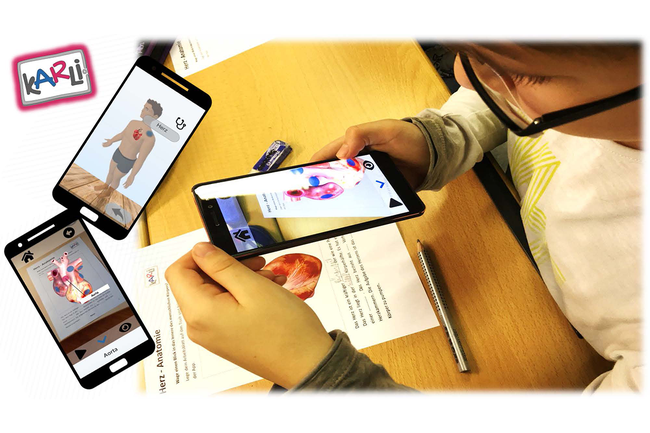KARLI at the IEEE VR 2022
From classroom to international stage: This year’s IEEE VR featured KARLI, a flagship project of Digital Healthcare
The IEEE Conference on Virtual Reality and 3D User Interfaces was once more held in an entirely virtual format this year. From 12 to 16 March, the international format brought together the latest and most relevant research results in the field of Virtual, Augmented, and Mixed Reality in the form of lectures, poster sessions, research demos, tutorials, and workshops.
One of the innovations presented there was the smartphone app KARLI, an outstanding project developed by the master degree programme Digital Healthcare. It allows primary school children to learn more about the human body by exploring a 3D model using Augmented Reality.
“The aim of our app is to support children in developing their health competence. The more basic knowledge each individual has, the better they will be able to take informed decisions concerning their own health later in life”, explains graduate Mariella Seel, the former student project lead of KARLI and now a researcher at the St. Pölten UAS’ Institute of Health Sciences.
Together with co-author Michael Andorfer, another Digital Healthcare graduate, and UAS lecturers Mario Heller and Andreas Jakl, Mariella Seel submitted the project to the conference as a paper.
- Find the presentation documents for KARLI in the download section of this news.
For the Kids: Anatomy Knowledge via App
The smartphone app for use in schools bears the likable name KARLI (the German abbreviation for “child-friendly Augmented Reality learning interface”) and was developed specifically for primary school pupils. It offers an entirely new way of learning more about the human body.
For example, KARLI lets the 3D hologram of a heart hover over the worksheet and explains its functions in everyday situations (at rest, during exercise, etc.) in a language that children can understand – this is what teaching can look like using Augmented Reality.
The evaluation results from 38 pupils and 3 teachers speak for themselves: The app has met with approval all around and has proven its worth as a suitable and helpful addition to health education.
It was developed in the master degree programme Digital Healthcare, which is a veritable pool of expertise from several disciplines. “This programme combines the knowledge of the healthcare sector with the latest digital technologies to develop applications for the challenges of the future”, emphasises Andreas Jakl, UAS lecturer at the Department of Media and Digital Technologies, who calls KARLI a flagship project in this regard.
Are you interested?
Further information on the master degree programme Digital Healthcare – The application portal is open until 31 May!
